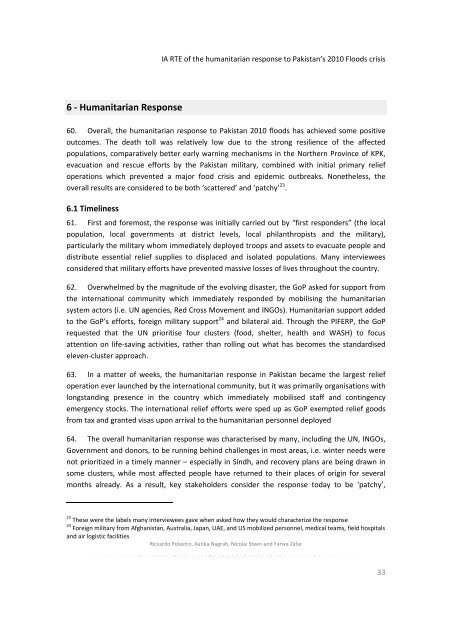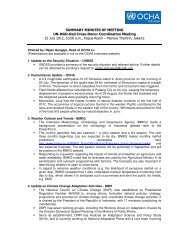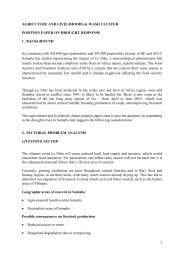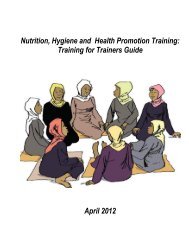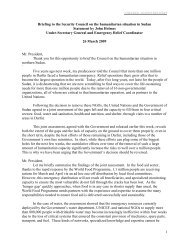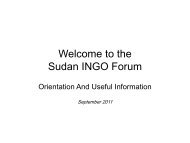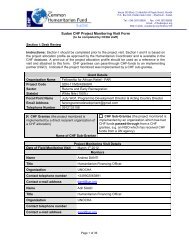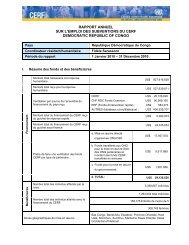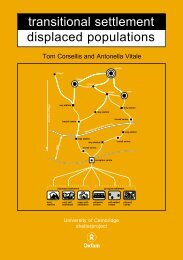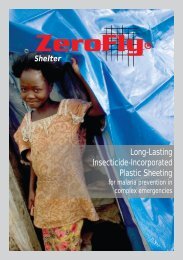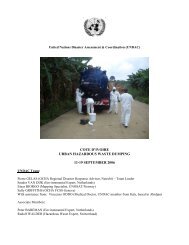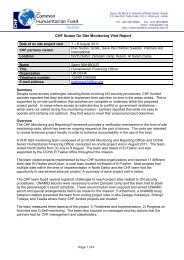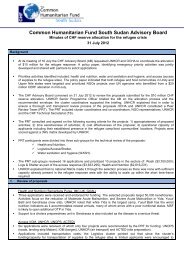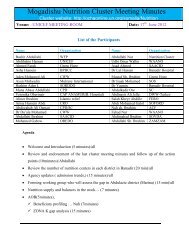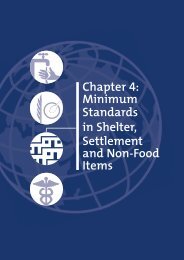Inter-Agency Real Time Evaluation of the Humanitarian ... - OCHANet
Inter-Agency Real Time Evaluation of the Humanitarian ... - OCHANet
Inter-Agency Real Time Evaluation of the Humanitarian ... - OCHANet
Create successful ePaper yourself
Turn your PDF publications into a flip-book with our unique Google optimized e-Paper software.
6 ‐ <strong>Humanitarian</strong> Response<br />
IA RTE <strong>of</strong> <strong>the</strong> humanitarian response to Pakistan’s 2010 Floods crisis<br />
60. Overall, <strong>the</strong> humanitarian response to Pakistan 2010 floods has achieved some positive<br />
outcomes. The death toll was relatively low due to <strong>the</strong> strong resilience <strong>of</strong> <strong>the</strong> affected<br />
populations, comparatively better early warning mechanisms in <strong>the</strong> Nor<strong>the</strong>rn Province <strong>of</strong> KPK,<br />
evacuation and rescue efforts by <strong>the</strong> Pakistan military, combined with initial primary relief<br />
operations which prevented a major food crisis and epidemic outbreaks. None<strong>the</strong>less, <strong>the</strong><br />
overall results are considered to be both ‘scattered’ and ‘patchy’ 23 .<br />
6.1 <strong>Time</strong>liness<br />
61. First and foremost, <strong>the</strong> response was initially carried out by “first responders” (<strong>the</strong> local<br />
population, local governments at district levels, local philanthropists and <strong>the</strong> military),<br />
particularly <strong>the</strong> military whom immediately deployed troops and assets to evacuate people and<br />
distribute essential relief supplies to displaced and isolated populations. Many interviewees<br />
considered that military efforts have prevented massive losses <strong>of</strong> lives throughout <strong>the</strong> country.<br />
62. Overwhelmed by <strong>the</strong> magnitude <strong>of</strong> <strong>the</strong> evolving disaster, <strong>the</strong> GoP asked for support from<br />
<strong>the</strong> international community which immediately responded by mobilising <strong>the</strong> humanitarian<br />
system actors (i.e. UN agencies, Red Cross Movement and INGOs). <strong>Humanitarian</strong> support added<br />
to <strong>the</strong> GoP’s efforts, foreign military support 24 and bilateral aid. Through <strong>the</strong> PIFERP, <strong>the</strong> GoP<br />
requested that <strong>the</strong> UN prioritise four clusters (food, shelter, health and WASH) to focus<br />
attention on life‐saving activities, ra<strong>the</strong>r than rolling out what has becomes <strong>the</strong> standardised<br />
eleven‐cluster approach.<br />
63. In a matter <strong>of</strong> weeks, <strong>the</strong> humanitarian response in Pakistan became <strong>the</strong> largest relief<br />
operation ever launched by <strong>the</strong> international community, but it was primarily organisations with<br />
longstanding presence in <strong>the</strong> country which immediately mobilised staff and contingency<br />
emergency stocks. The international relief efforts were sped up as GoP exempted relief goods<br />
from tax and granted visas upon arrival to <strong>the</strong> humanitarian personnel deployed<br />
64. The overall humanitarian response was characterised by many, including <strong>the</strong> UN, INGOs,<br />
Government and donors, to be running behind challenges in most areas, i.e. winter needs were<br />
not prioritized in a timely manner – especially in Sindh, and recovery plans are being drawn in<br />
some clusters, while most affected people have returned to <strong>the</strong>ir places <strong>of</strong> origin for several<br />
months already. As a result, key stakeholders consider <strong>the</strong> response today to be ‘patchy’,<br />
23<br />
These were <strong>the</strong> labels many interviewees gave when asked how <strong>the</strong>y would characterize <strong>the</strong> response<br />
24<br />
Foreign military from Afghanistan, Australia, Japan, UAE, and US mobilized personnel, medical teams, field hospitals<br />
and air logistic facilities<br />
Riccardo Polastro, Aatika Nagrah, Nicolai Steen and Farwa Zafar<br />
33


